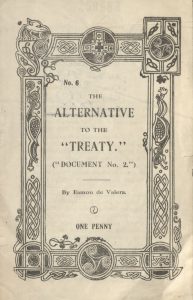DECEMBER 1921
December 1921
James Durney
The month of December 1921 began with such promise with the signing of the Anglo-Irish Treaty on 6 December and the subsequent release of thousands of republican prisoners. However, on 8 December President Éamon de Valera denounced the Anglo-Irish Treaty as being ‘in violent conflict with the majority of this nation’. Two days later, at a meeting of the Supreme Council of the Irish Republican Brotherhood (IRB), eleven members supported the Treaty while four opposed it. On 14 December, as the British parliament began the debate on the Anglo-Irish Treaty, Unionist leader Sir Edward Carson attacked the Treaty in the House of Lords, while Northern Ireland Prime Minister, Sir James Craig, rejected the Boundary Commission clause in the Treaty and refused to accept Sinn Féin’s right to speak for all Ireland.
The Irish debate began on 14 December and the following day de Valera produced an alternative to the Treaty which became known as Document No. 2 – he withdrew it from consideration on 19 December. On 16 December the Treaty was passed in both the House of Commons and the House of Lords with a sizeable majority. In the Irish Parliament Arthur Griffith introduced a motion: ‘That Dáil Éireann approved the treaty between Great Britain and Ireland signed in London on December 6, 1921.’
Original copies held in Local Studies Department
In Co. Kildare low-key violence continued. On 21 December Lord Mayo’s shooting party was held up by armed men and their shotguns confiscated. The weapons were returned after IRA Liaison Officer Liam Murphy intervened – Capt. Murphy had escaped from the Curragh’s Rath Internment Camp the previous September. In two separate occasions houses belonging to local landlord H. A. F. Verschoyle were burned down near Kilberry, Athy. On Christmas Eve the band room of the Athy War Pipers’ Band was also burned down.
At a special meeting of Kildare County Council, on 30 December, summoned to consider the Treaty, a motion of support for the Treaty was passed by five votes to two. (Éamon Ó Modhrain dissented, while Tom Harris did not vote.) The following day The North Kildare Farmers’ Union, in Naas, called on the Dáil to ‘ratify the treaty’, while the South Kildare Farmers Union, in Athy, did likewise.
The scene was set for a tumultuous few weeks of debate, discussion and division, which changed Irish politics forever.


